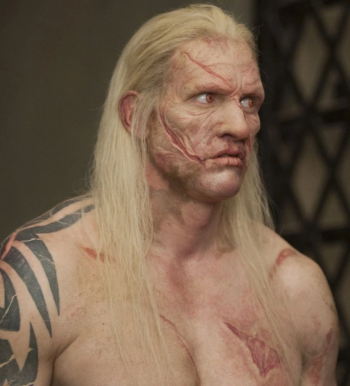Theokoles
Theokoles is a legendary retired Greek gladiator, famously known as the "Shadow of Death."
Appearance[edit | edit source]
Theokoles is an imposing Greek albino gladiator with ghostly pale skin and red eyes. His body is a testament to countless battles, covered in scars that lend credence to Varro's claim that Theokoles has been cut a thousand times. Notably, his face bears two deep gashes, and additional scars mark his torso and arms. One of his shoulders features a tattoo, a memento from his time with a pirate crew. His albinism explains his pallor, red eyes, and sensitivity to light, a vulnerability exploited by Crixus, who temporarily blinded him using reflected sunlight. Theokoles fights with minimal armor, usually only a balteus, and wields two oversized swords. These weapons, larger than typical gladii, suit his massive stature.
Personality[edit | edit source]
Theokoles, the legendary Greek gladiator, prizes glory and fame above all else, even after amassing countless fortunes from his numerous victories in the arena. He revels in entertaining the crowd by toying with his opponents, initially feigning a lack of true skill before unleashing his full, formidable power. This theatrical approach only enhances his mystique and amplifies his reputation. Renowned for his high tolerance for pain, Theokoles can endure grievous, even seemingly fatal wounds, and continue fighting as if unscathed. Despite his fearsome exterior and brutal combat style, Theokoles harbors a kind heart; he is deeply disturbed by the suffering of women and cannot bear to see or hear them in distress. His enduring love for the arena stems from his sense of belonging there—having never been accepted anywhere else, the arena is where he found his true home and flourished.
Combat Prowess[edit | edit source]
Theokoles stands as one of the most formidable warriors in the series, known for his unparalleled size, strength, and endurance. His legendary battles are etched into the history of the arena. Demonstrating exceptional skill, he has bested Oenomaus at his peak and inflicted serious injuries on Crixus, both of whom are among the series' most accomplished fighters. Remarkably, Theokoles has never been defeated throughout his illustrious career, even once overcoming 100 men in a single arena match. His immense strength and resilience allow him to sustain and fight through numerous wounds without faltering.
Theokoles is adept in the Dimachaeri style, a two-sword fighting technique typically favored by smaller, more agile gladiators. Despite his colossal size, he wields both blades with remarkable skill and precision, mastering this style as effectively as any other Dimachaeri.
Biography[edit | edit source]
Motion Comic[edit | edit source]
Theokoles' Early Life
Theokoles was born in a small village in the region of Sparta, Greece. Even as a child, his immense size and strength set him apart. Despite his intimidating stature, his mother loved and cared for him deeply. After her passing, Theokoles, a gentle giant, lived a simple life as a farmer. However, his fellow villagers, frightened by his appearance, ostracized him and treated him like a monster. The only person to show him genuine kindness was Karina, with whom he fell deeply in love. Tragically, Karina died during their first intimate encounter, which led the villagers to turn on Theokoles with greater ferocity, labeling him a monster and attacking him. Overcome with grief and rage, Theokoles defended himself, killing those who assailed him. He then buried Karina beside his mother and left the village, his heart heavy with sorrow.
Theokoles’ Time with Pirates
After wandering for some time, Theokoles saved the life of Gharib's son. Gharib, a pirate captain, welcomed Theokoles into his crew. Sailing the seas with the pirates, Theokoles gained wealth and a reputation, and he even acquired a tattoo to commemorate his time with them. However, when the pirates attempted to assault several women, Theokoles' sense of justice and kindness was awakened. He turned against the pirates, killing them to protect the women. Amid the chaos, a violent storm hit, and the ship was wrecked by the raging sea. Theokoles was cast adrift into the unforgiving ocean.
Theokoles’ Capture and Rise in the Arena
Eventually, Theokoles washed ashore on Roman territory, where he was captured by Roman soldiers and sent to the gladiatorial arena. It was here, amidst the brutal battles and roaring crowds, that he found a place where his strength and skill were celebrated rather than feared. Years of fighting and victory transformed him into a legendary figure in the arena, with his name becoming synonymous with invincibility.
In one of his most notable battles, Theokoles faced Oenomaus, the Champion of the House of Batiatus. The duel was fierce, with both fighters displaying incredible prowess. Although Theokoles' superior strength gave him the upper hand, he was moved by the cry of Melitta, Oenomaus’ beloved. In a moment of unexpected compassion, he allowed Oenomaus to retrieve his sword. Recognizing Oenomaus' exceptional skill and endurance, the editor of the games declared both men victorious. While Theokoles felt content with the outcome, Oenomaus was personally disheartened by the shared victory.
Theokoles' Legacy
Over the years, Theokoles continued to dominate the arena, accumulating vast fortunes and an undefeated record against every gladiator he faced. His fame grew with each victory. Eventually, he retired, disappearing into an unknown place.
Blood and Sand[edit | edit source]
Whispers of a Legend
In the series "Blood and Sand," the name Theokoles is spoken with a mix of fear and reverence. Kerza and Varro recount tales of his legendary battles, emphasizing how he had been cut over a thousand times yet remained undefeated, with only one opponent ever surviving an encounter with him. Despite these ominous stories, Spartacus remains skeptical about Theokoles' reputation, leading the other gladiators to mock his disbelief.
Theokoles' Return
To overshadow his rival Batiatus, Solonius arranges for the retired Theokoles to return to the arena. Facing a foe of such renown, Batiatus decides that not even one of his best gladiators would suffice alone. Thus, he pits both Spartacus and Crixus against Theokoles. In preparation for the upcoming fight, Oenomaus rigorously trains Spartacus and Crixus, pushing them to their limits with an intensity meant to ready them for the colossal challenge ahead. He shares his own harrowing encounter with Theokoles, revealing his scars and emphasizing that only through unity can they hope to survive.
The Epic Battle
On the day of the games, the arena buzzes with excitement and anticipation as Theokoles, the "Shadow of Death," steps into the ring. The crowd erupts in cheers, mesmerized by the sight of the legendary giant. Spartacus and Crixus charge at Theokoles together, their combined efforts initially appearing to gain the upper hand. They manage to inflict significant wounds on Theokoles, and the crowd roars in approval as the seemingly invincible warrior falls. Spartacus and Crixus begin to celebrate what they believe is a swift victory.
However, the cheering halts abruptly when Theokoles rises to his feet, revealing he had been merely toying with them. With a mocking shout of Crixus' famous line, "Capua! Shall I begin?" Theokoles taunts his opponents and the battle resumes. The tide quickly turns as Crixus, refusing to cooperate with Spartacus, is overpowered by Theokoles and suffers a grievous wound to his back.
The Climactic Moment
As Theokoles moves to finish off Crixus, Spartacus intervenes, diverting the giant's attention. Using Crixus' shield to launch himself into the air, Spartacus delivers a powerful strike. Initially, he manages to hold his ground, but Theokoles soon gains the upper hand, overwhelming Spartacus with his sheer strength. Even with his insides exposed, Crixus refuses to surrender. He grabs a nearby helmet and reflects sunlight into Theokoles' eyes, temporarily blinding him. Seizing this opportunity, Spartacus maneuvers behind Theokoles, forcing him to his knees with a series of relentless strikes, and ultimately decapitates him, ending the battle.
Legacy of Theokoles
In the aftermath of Spartacus' rebellion, his defeat of Theokoles becomes a part of his legend. Romans, including Mercato, often refer to Spartacus as the "Slayer of the Shadow of Death," a title that echoes with as much infamy as "Bringer of Rain," cementing Spartacus' place in history.
Trivia[edit | edit source]
- Actor’s Stature: Reuben De Jong, who portrays Theokoles, stands at an impressive 208 cm (6'10") and weighs 140 kg (308 lbs). Although he is notably tall, he is significantly shorter than the towering 10+ feet height attributed to Theokoles in the series.
- Survivors of Theokoles: In the series, Crixus and Oenomaus are the only gladiators who fought against Theokoles and survived, a testament to their exceptional skill and resilience.
- Gladiators with Tattoos: Theokoles is one of the few gladiators in the series depicted with tattoos, alongside Gannicus and an unnamed Murmillo. Although the recruit Segovax also had a tattoo, he was killed before being fully accepted into the gladiatorial brotherhood.
- Historical Context of Tattoos: In ancient times, tattoos were typically associated with non-Roman and non-Greek cultures, particularly the Celts. Both the Romans and Greeks viewed tattoos as marring the natural beauty of the body. As a result, tattoos became markers for slaves, criminals, and prisoners of war, often used as a form of punishment or branding.
- Possible Spartan Ancestry: Theokoles hails from the region of Laecedaemonia (Laconia) in southern Greece, suggesting that he may have Spartan roots. This heritage aligns with the formidable reputation and warrior spirit he exhibits in the series.

